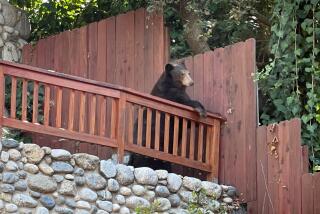Orphanage Teaches Bears to Fear Humans
- Share via
BUBONIDZE, Russia — Bear-hunting season in Russia opened Aug. 1, and it might seem an inauspicious time to release two motherless cubs into the wild.
But father-and-son gamekeepers Valentin and Sergei Pazhetnov are former hunters, and they specialize in training bear orphans to survive all the dangers of Russia’s deep forests, especially predators on two legs.
The sister cubs, Prima and Dina, were found by a game warden in April. Apparently a woman had disturbed their den, provoking an attack by the mother bear, which then ran off and abandoned the 3-month-old cubs.
For four months, they have lived at the bear orphanage that the Pazhetnov family runs as part of an animal sanctuary in Bubonidze, a remote settlement 280 miles west of Moscow.
With the help of international donations, the Pazhetnovs have raised and released 64 bear orphans in the last eight years. The facility is the only one of its type in Russia.
What sets it apart is that the regimen is not warm and friendly. Here, the bears are taught with “tough love,” and contact with humans is kept to a minimum. Any gesture of friendliness by the bears is met with a swift slap on a tender nose.
The reason? Bear cubs raised by humans often become too trusting, even running up to hunters as if to make friends. So Valentin, who studied animal behavior at Moscow State University, has developed a program to care for young bears without letting them get too attached.
“What they’re doing is making sure these bears retain their biological fear of humans,” says Simon Pope of the Britain-based International Fund for Animal Welfare, which helps finance the orphanage.
However, affection flows freely in the other direction.
“It’s exactly the same emotion as if our children had left home,” says Sergei. “We looked after them for so long and now we’ve released them. But I’m sure they’ll survive.”
Bears are plentiful in Russia, and hunting is considered part of the national heritage.
Soviet leaders like Nikita Khrushchev and Leonid Brezhnev showed off their prowess with a rifle in front of visiting dignitaries.
Ironically, most cubs are brought to the orphanage by hunters who have killed a mother bear. Female bears tend to stay in their lairs in January when nursing their cubs, making them sitting targets.
Cubs younger than 3 months have little sight, hearing or sense of smell, and they can live inside the wooden cottage with Valentin and his wife, Svetlana.
But once their senses are active, they are moved to an enclosure deep in an animal sanctuary where they can learn to climb trees, dig dens and scavenge for food.
The Pazhetnovs provide food and veterinary care, but limit contact, touching the bears only with gloves and rebuffing any overtures of friendship.
After four months, Valentin decided the cubs Prima and Dina were ready to return to the woods.
The cubs, sedated for the car trip, are tagged and then awakened when they reach an area near their former den. As they amble off, they pause for a moment, their heads poking above the tall grass, and look back toward the humans.
But just briefly. Within moments, their brown coats fade into the darkness among the trees.
More to Read
Sign up for Essential California
The most important California stories and recommendations in your inbox every morning.
You may occasionally receive promotional content from the Los Angeles Times.













